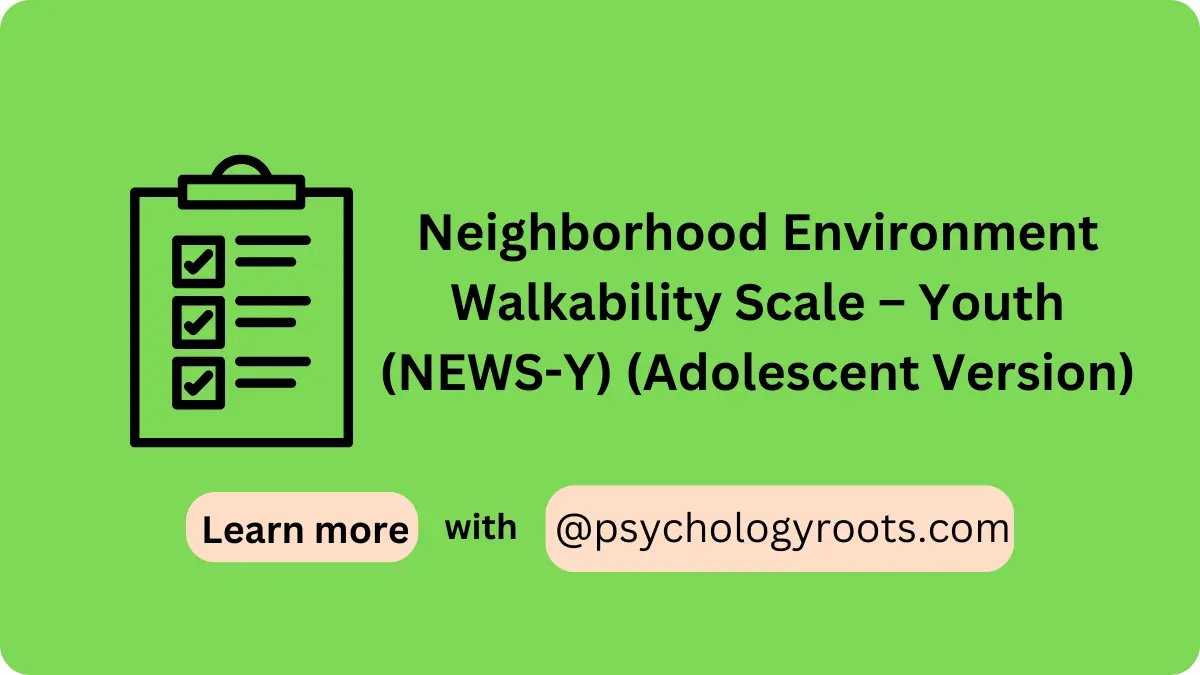Table of Contents
Neighborhood Environment Walkability Scale – Youth (NEWS-Y) (Adolescent Version)
Here in this post, we are sharing the “Neighborhood Environment Walkability Scale – Youth (NEWS-Y) (Adolescent Version)”. You can read psychometric and Author information. We have thousands of Scales and questionnaires in our collection (See Scales and Questionnaires). You can demand us any scale and questionnaires related to psychology through our community, and we will provide you with a short time. Keep visiting Psychology Roots.
About Neighborhood Environment Walkability Scale – Youth (NEWS-Y) (Adolescent Version)
Scale Name
Neighborhood Environment Walkability Scale – Youth (NEWS-Y) (Adolescent Version)
Author Details
Brian E. Saelens, Ph.D, Rosenberg, D., Ding, D., Sallis, J. F., Kerr, J., Norman, G. J., Durant, N., Harris, S. K., & Saelens, B. E.
Translation Availability
English

Background/Description
Neighborhood Environment Walkability Scale – Youth (NEWS-Y) is developed by Brian E. Saelens, Ph.D. The NEWS-Y is a 67-question instrument that measures perception of neighborhood design features that may be related to physical activity in youth. The tool assesses residential density, land use mix (including indices of proximity and accessibility), street connectivity, infrastructure for walking/cycling, neighborhood aesthetics, and traffic and crime safety.
There are separate self-administered versions for parents and adolescents (aged 11 and above). The NEWS-Y instrument was derived from the NEWS-A, adaptations were made based on interviews with youth and parents, and it was tested in the Active Where? Study. The NEWS-Y was created in an attempt to provide a more succinct and empirically derived measure of various aspects of the built environment we purport to be related to walking in youth. The results of multi-level confirmatory factor analysis, based on data from the Neighborhood Quality of Life Study, are reported elsewhere (see Cerin, E., Saelens, B.E., Sallis, J.F., & Frank, L.D. (2006).
Administration, Scoring and Interpretation
- Obtain the Copy: Available through academic publications or by contacting the authors of the NEWS-Y research article.
- Purpose: To measure adolescents’ perceptions of their neighborhood environment regarding walkability and physical activity.
- Instructions: Adolescents respond to items related to neighborhood features, such as safety, walkability, and accessibility of parks and recreational areas.
- Time: Approximately 15-20 minutes.
- Administer the Scale: The NEWS-Y is a self-report tool generally administered in a structured environment, such as schools or community programs.
Reliability and Validity
The NEWS-Y shows strong psychometric properties. Studies have reported good internal consistency reliability, with subscale Cronbach’s alpha values ranging from 0.61 to 0.91. Test-retest reliability has also been satisfactory, particularly in measuring elements like safety and accessibility. NEWS-Y is validated as an effective tool for understanding the relationship between neighborhood characteristics and physical activity among youth, contributing valuable insights into public health and urban planning.
Available Versions
Multiple-Items
Reference
Rosenberg, D., Ding, D., Sallis, J. F., Kerr, J., Norman, G. J., Durant, N., … & Saelens, B. E. (2009). Neighborhood Environment Walkability Scale for Youth (NEWS-Y): reliability and relationship with physical activity. Preventive medicine, 49(2-3), 213-218.
Important Link
Scale File:
Frequently Asked Questions
What does NEWS-Y assess?
NEWS-Y assesses adolescents’ perceptions of their neighborhood’s walkability and environmental factors influencing physical activity.
How long does it take to complete the NEWS-Y?
The scale typically takes about 15-20 minutes to complete.
Is NEWS-Y suitable for all age groups?
No, NEWS-Y is specifically designed for adolescents and may not be suitable for younger children or adults.
Can NEWS-Y results guide urban planning?
Yes, the insights from NEWS-Y can inform community planning by identifying areas that need improvement to encourage physical activity among youth.
Disclaimer
Please note that Psychology Roots does not have the right to grant permission for the use of any psychological scales or assessments listed on its website. To use any scale or assessment, you must obtain permission directly from the author or translator of the tool. Psychology Roots provides information about various tools and their administration procedures, but it is your responsibility to obtain proper permissions before using any scale or assessment. If you need further information about an author’s contact details, please submit a query to the Psychology Roots team.
Help Us Improve This Article
Have you discovered an inaccuracy? We put out great effort to give accurate and scientifically trustworthy information to our readers. Please notify us if you discover any typographical or grammatical errors.
Make a comment. We acknowledge and appreciate your efforts.
Share With Us
If you have any scale or any material related to psychology kindly share it with us at psychologyroots@gmail.com. We help others on behalf of you.